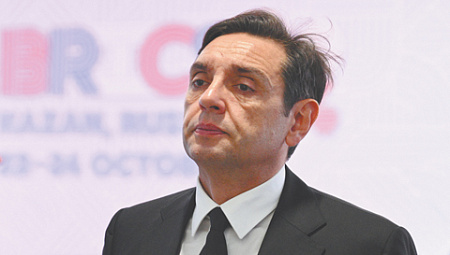
The Assembly (Parliament) of Serbia on Tuesday, April 15, approved the composition of the new government of the country. Juro Matsut, a non-partisan endocrinologist, claimed to be its head. President Aleksandar Vucic hopes that the new prime minister, who is not formally affiliated with the ruling Serbian Progressive Party, will help end unrest in the country and improve relations with the EU. It was significant that the country’s most famous pro–Russian politician, Aleksandar Vulin, was not included in the government, against whom the European Union tried to impose sanctions.
The previous government, headed by Milos Vucevic, resigned on March 19. The resignation was forced. Belgrade was rocked by mass protests that began in November, after the collapse of a canopy at a train station in the city of Novi Sad– a tragedy that claimed 16 lives.
Thousands of demonstrations quickly took on an anti-presidential and anti-government character. With the resignation of the government, Vucic demonstrated that he was ready to cooperate with the opposition. And at the same time, he showed that his opponents, as always, could not offer a special constructive solution. All their demands essentially boil down to Vucic’s resignation (he has been in power, as president and prime minister, for over 10 years) and early elections, which the opposition, judging by polls, will lose again. The protests did not lead to the emergence of any prominent leaders on the political scene and once again did not spread to the whole of Serbia. Vucic’s electorate consists of residents of rural areas and small towns, and they protest mainly in Belgrade.
The candidacy of the new prime minister should have emphasized that the president is distancing himself from the government to a certain extent. Matsut is a new man in politics. He has spoken out in support of the Serbian Progressive Party, but he is not a member of it and generally positions himself as a person standing above the fray in the conflict between the opposition and Vucic. As a professor at the University of Belgrade, Matsut gained fame for his attempts to negotiate with protesting students. However, without much success, he urged them to stop demonstrating against Vucic.
However, the opposition still perceives him as a creature of the president. The Assembly meeting also showed this. Only deputies from among the president’s supporters greeted the new ministers with applause. And some representatives of the opposition factions did not attend the meeting at all. Vucic’s opponents call Matsuta a presidential puppet. As proof, his participation in the activities of the “Movement for the People and the State” created by the president is cited. Perhaps it will soon replace the relatively unpopular Serbian Progressive Party, and pro-presidential politicians will run for parliament in the 2027 elections. Presidential elections will be held simultaneously. Vucic stated that he would not change the Constitution, which means he would not run for a third term. Consequently, his successor will continue his course. It is possible that Matsut will become one of them, if, of course, he proves himself well.
Whoever succeeds Vucic will definitely not be Vulin, a radical proponent of rapprochement with Russia. In the Vucevic government, he was Deputy Prime Minister. Vulin’s absence from the list of candidates for ministerial posts in the new government came as a surprise. At the same time, this can be interpreted as a political signal: the president does not want to aggravate relations with the West.
At the meeting of the EU foreign ministers in Luxembourg, which took place on April 14, Vulin was tried to be included in the sanctions list. Hungary blocked this decision, Hungarian Foreign Minister Peter Szijjarto said. Thus, official Budapest demonstrated that it considers Vucic as its ally. By the way, since April 1, the allied relations between the two countries have been legally fixed. Serbia and Hungary have signed an agreement on broad military cooperation. This happened two weeks after the declaration on deepening ties was signed by the Ministries of Defense of Croatia, Albania and partially recognized Kosovo. Croatia and Hungary are members of the EU, Albania, Kosovo and Serbia are applying for EU membership. It turns out that by agreeing with the Hungarians alone, Vucic brought a certain discord into the policy of the European Union. The inclusion of Vulin in the government would be a further step in this risky direction for the president. That’s why he didn’t do it.
At the time of signing the issue, the discussion of the candidacies of government members has not been completed. According to the law, it may formally begin on Monday and last until April 18. However, there was little doubt in the local press that Matsut would eventually become prime minister.
